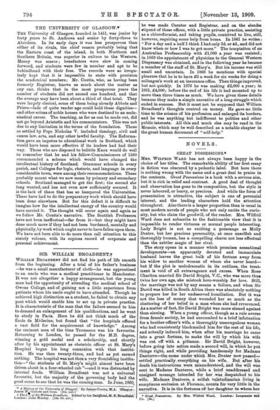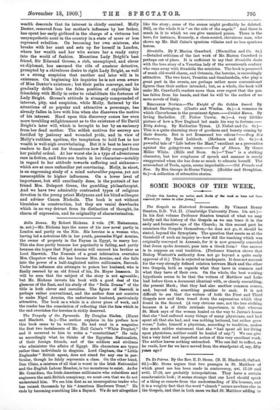NOVELS.
GREAT POSSESSIONS.*
Mits. WILFRID WARD has not always been happy in the choice of her titles. The remarkable ability of her first essay in fiction was obscured by a pedantic label. But here there is nothing wrong with the name and a great deal to praise in the contents. Great Possessions is a book with a serious aim, but it is rich in relief and contrast. A good deal of thought and observation has gone to its composition, but the style is never laboured, or heavy, or precious. And while the form of presentation is attractive, the subject is one of perennial interest, and the leading characters hold the attention throughout. Also there is a larger proportion than is usual in most modern novels of people who not only excite the curio- sity, but who claim the goodwill, of the reader. Mrs. Wilfrid Ward does not subscribe to the fashionable view that it is impossible to render virtuous or normal people interesting. Lady Bright is not so exciting a personage as Molly Dexter, but her gracious personality, at once unselfish and thoroughly human, has a compelling charm not less effectual than the subtler magic of her rival.
The story opens in a manner which promises sensational developments—an apparently devoted and immaculate husband leaves the great bulk of his fortune away from his widow to another woman of whom she never heard— but if the plot is melodramatic in its outlines, the treat- ment is void of all extravagance and excess. When Rose Charlton married Sir David Bright, V.C„ who was more than twice her own age, she mistook hero-worship for love. Still, the marriage was not by any means a failure, and when Sir David was killed in South Africa there was absolutely nothing to prepare her for her undeserved humiliation. But it was not the loss of money that wounded her so much as the shattering of her belief in a man whom she had reverenced. As a matter of fact, Sir David Bright was more sinned against than sinning. When a young officer, though as a rule averse from female society, he had succumbed to a brief infatuation for a brother-officer's wife, a thoroughly unscrupulous woman who had consistently blackmailed him for the rest of his life, and actually induced him, when after his_ marriage he came into a great fortune, to make the will by which his wife was cut off with a pittance.. Sir David Bright, however, before going into action made a second will, in which he put things right, and _while providing handsomely for Madame Danterre—the name under which Mrs. Dexter now passed— settled practically everything on his wife. But .fter his death his instructions were misunderstood, and the will was sent to Madame Danterre, while a brief unaddressed and unsigned message, intended for her was despatched to his wife. Madame Danterre, a selfish valetudinarian living in sumptuous seclusion at Florence, counts for very little in the narrative. It 'is in the fortunes-of her daughter to whom her • Great P0118.118i0111. By Mrs. Wilfrid Ward. London: Longman* And Co. [6s.] wealth descends that its interest is chiefly centred. Molly Dexter, removed from her mother's influence by her father, has spent her early girlhood in the charge of a virtuous but unsympathetic aunt in the country in a state of more or less repressed rebellion. On becoming her own mistress, she breaks with her aunt and sets up for herself in London, where her wealth and her wits secure her a ready entry into the world of fashion. Meantime Lady Bright's best friend, Sir Edmund Grosse, a rich, unemployed, and clever ex-diplomat, has assumed the role of amateur detective, prompted by a chivalrous desire to right Lady Bright, as well as a strong suspicion that another and later will is in existence. On beginning his inquiries he is not even aware of Miss Dexter's existence ; but their paths converge, and be gradually drifts into the false position of exploiting his friendship with Molly in order to rehabilitate the fortunes of Lady Bright. Grosse's attitude is strangely compounded of interest, pity, and suspicion, while Molly, flattered by the attentions of so popular and attractive a personage, has already fallen in love with him when she discovers the motive of his interest. Hard upon this discovery comes her even more troubling enlightenment as to the existence of Sir David Bright's later will, which is brought to her by an emissary from her dead mother. The selfish motives for secrecy are fortified by jealousy and wounded pride, and in view of Molly's ruthless egotism, the temptation to hold fast to her wealth is well-nigh overwhelming. But it is best to leave our readers to find out for themselves how Molly emerged from her painful ordeal. At her worst she is a type of adventuress rare in fiction, and there are traits in her character—notably in regard to her attitude towards suffering and sickness— which are at once unfamiliar yet convincing. Molly, in short, is an engrossing study of a mind naturaliter pagana, yet not insusceptible to higher influences. On a lower level of importance, but still excellently done, is the portrait of her friend Mrs. Delaport Green, the gambling philanthropist. And we have two admirably contrasted types of religious devotion in the young priest Molyneux and his blind colleague and adviser Canon Nicholls. The book is not without blemishes in construction, but they are venial drawbacks which in no way detract from its distinction of thought, its charm of expression, and its originality of characterisation.















































 Previous page
Previous page